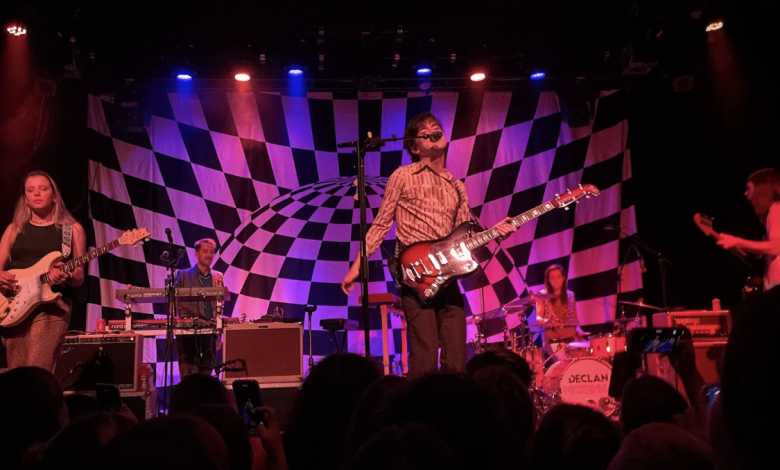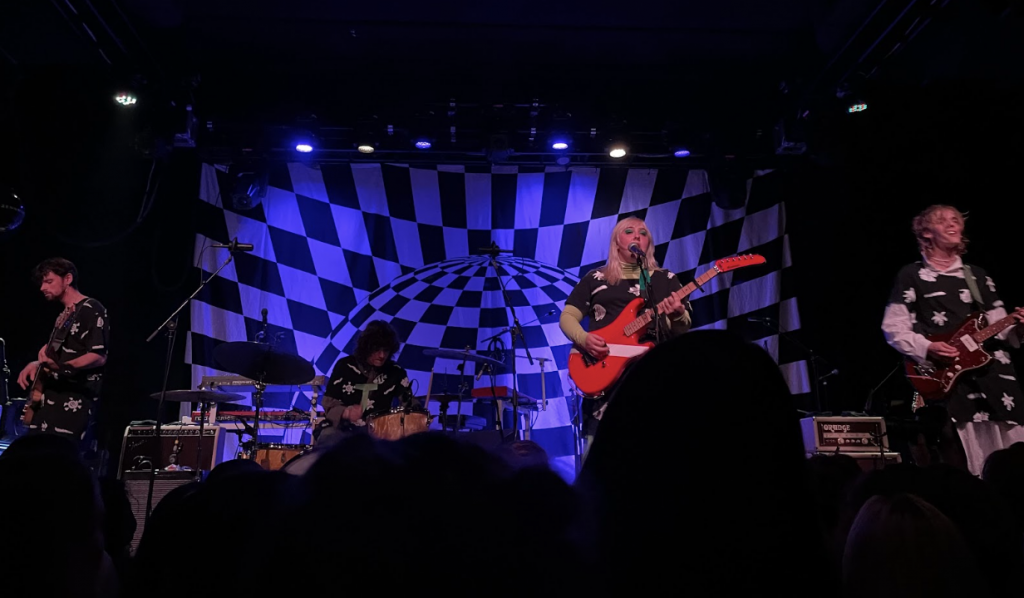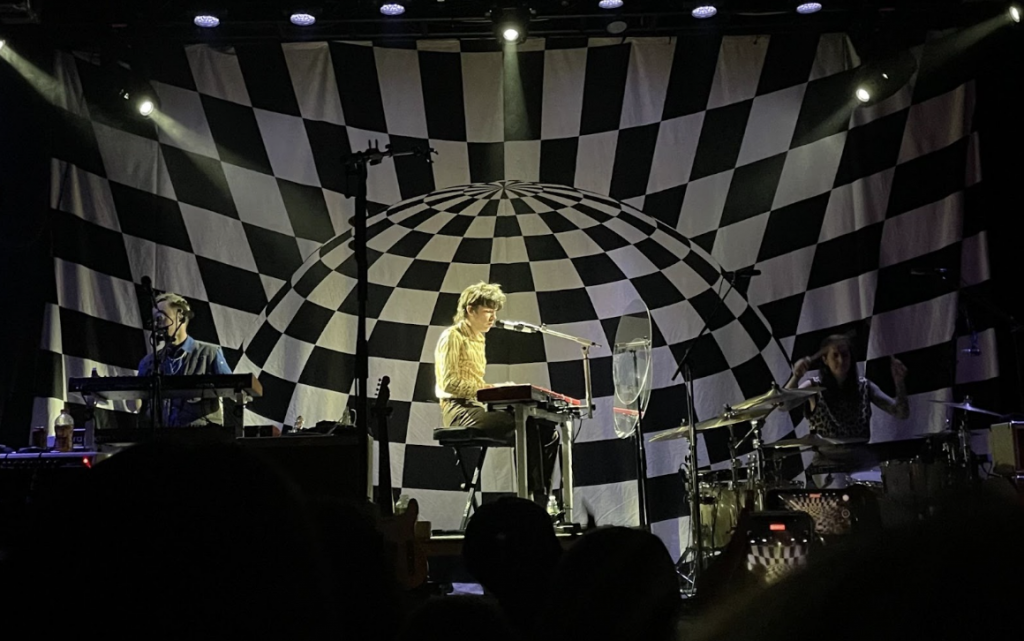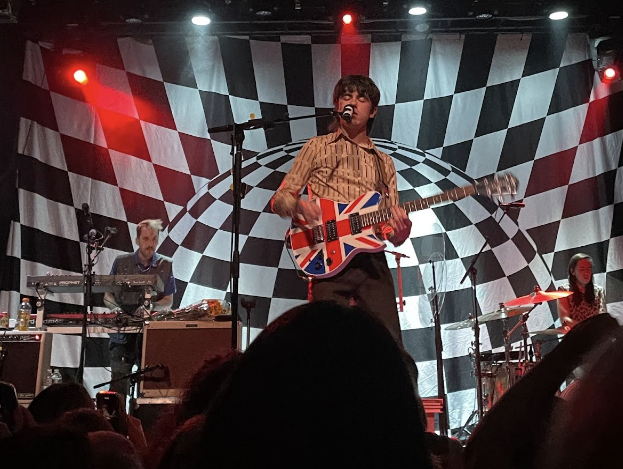Declan McKenna Concert Review: A Rapturous Night at The Sinclair

Kaitlyn Hardy ‘25 / Emertainment Monthly Staff Writer
On Tuesday, October 11, The Sinclair in Cambridge welcomed British indie alternative artist Declan McKenna for his Zeroes tour.
The album prompting the tour, Zeros, was released back in 2020, but the COVID-19 Pandemic prevented McKenna from touring upon its release. This tour brought him back to the U.S. for the first time since 2019, his return being better late than never.
McKenna’s concert marked his second live performance at The Sinclair. His first show, at age 18, was in 2017. While performing on the 11th, he joked that an artist comes to The Sinclair “the first time when they’re on their way up, second time when they’re on their way down. Happy to be back!”
Opening for McKenna was Annie DiRusso, gracing the stage with green glow-in-the-dark eye shadow and a dress that matched with the rest of her band. She performed a spunky, albeit brief, opening act. She started with her song, “Call It All Off,” next played “Don’t Swerve,” then treated the audience to a new song called “Emerson” coming out in January 2023. This song was as upbeat and happy as her other hits, but appeared to be especially personal to DiRusso, who said it is about her childhood. DiRusso continued her set with “Infinite Jest,” “Nine Months,” and closed with her most popular song, “Coming Soon.”

Next came the man of the hour – Declan McKenna. As McKenna entered the stage, audiences’ cheers bled into the opening notes of his song, “Beautiful Faces.” This song choice perfectly captured the energy of the night that followed— rousing, celebratory, and energetic. With every ring of the line “Put your hands up and lead us back home” audience members reached their arms towards McKenna and pulsed their hands and bodies to the beat of the song.
McKenna continued with “Rapture” and “Sagittarius A*,” both from Zeroes. He then followed with what he referred to as his “old tunes”: “Make Me Your Queen” and “The Kids Don’t Wanna Come Home,” both from his first album, and “What Do You Think About the Car?” which was released in 2017.
During the performance of “The Kids Don’t Wanna Come Home,” the crowd’s cheers along to the chorus were reminiscent of the studio version of the song—which features the cheering voices of children chanting along to the final chorus. Hearing this incited a surreal sensation, reanimating the song in a way that was so perfectly unique. The audience was one with his song, involved in a piece of music that elates the listener.
Even without that moment, McKenna’s performance of each song consistently reached studio-level quality vocals. His vocal range and control have grown drastically throughout his career as an artist. Although his voice and style are still known for their unique, almost adolescent whines and breaks, he has now adopted these as his brand. He has mastered the ability to manipulate his voice, tone, and vocal personality with impressive control. He highlights this in the higher notes of songs such as “Make Me Your Queen,” “You Better Believe!!!,” and “Why Do You Feel So Down” as well as in the powerful yelling of songs such as “British Bombs,” “Rapture,” and “Twice Your Size”.
McKenna then went back to playing songs from Zeros. After performing “Twice Your Size,” McKenna said he would “slow things down” by playing his song, “Emily.” While this song is certainly more stripped down than his typical electric-shocked, pulsating tunes, the emotion of the song still moved people’s bodies to the beat of the drums and strums of the guitar.
A few of the songs on the Zeroes album – such as “Beautiful Faces,” “Sagittarius A*,” and “The Key to Life on Earth” – open with similar electronic effects that, when heard live, suspend the audience in ecstatic anticipation until a defining lyric or note is heard.
McKenna’s songs seamlessly blend with one another, separated only by sips of tea, brief anecdotes of love, and appreciation for the venue. At one point during the concert, McKenna shared a comical story about the last time he performed at The Sinclair, where he climbed the venue’s balcony.
Following the story, McKenna and his band continued performing with “My House,” a laid back song that contrasted with the spirited energy of the song that followed, “The Key to Life on Earth.” He then sang another slow tempoed song, “Listen to Your Friends,” during which audiences chanted along to the monologue ending. Next, upon hearing the opening notes of “Humongous,” the crowd yelled out the opening audio of that song.
While the audience’s energy may have calmed slightly towards this middle section of the concert – between “Emily” and “Humongous” – the racing ending of “Humongous” unleashed audience’s spirits. The audience continued to foster this energy as the song meshed into “Isombard.” During this song, with every chanting of the lyric, “Well, if you can’t walk then run,” the ground shook with the audiences’ stomps.
The next song, “You Better Believe!!!” drew on this energy as well, with audiences jumping up and down at every build of the chorus and belting “We’re gonna get ourselves killed //Oh yeah.”

The last song of this set was “Be An Astronaut,” a less energetic yet phenomenally powerful track. McKenna played the piano, and the ending was a powerful showcase of McKenna’s guitarist, Isabel Torres.
When McKenna and his band parted the stage, the audience chanted his name until he returned, even looking for him on the balcony, thinking he would replay his 2017 concert story. To think of McKenna’s second set as an encore would be inappropriate, rather there was an intermission between acts. Instead of the average one or two songs, McKenna kept the night racing, performing 5 more songs.
McKenna opened the performance back up with “Daniel, You’re Still A Child,” a groovy song during which the singer manned the piano once again. Next was “Why Do You Feel So Down” then “Eventually, Darling.”
“Eventually, Darling” slowed the crowd down until its powerful instrumental outro, preparing the audience for the wave of excitement that came with the opening notes of “Brazil,” his most popular song. The song engulfed the venue, bombarded by the screaming of the crowd.

This energy continued into his final song, the fervid “British Bombs,” during which he performed using a guitar printed with the Union Jack – which he inevitably smashed. “He made such a statement,” said a crowd member.
Given the somewhat political undertones to many of McKenna’s songs – “British Bombs,” “Listen to Your Friends,” and “The Kids Don’t Wanna Come Home,” – hearing a crowd of people chant along made the concert even more of a uniting, dynamic setting than it would be for songs or artists that didn’t have so much meaning attached to them. The guttural yelling featured during the lyrics of “British Bombs,” crafted an thrilling and cathartic ending to an overall vivacious night.
Wrapping up the song, McKenna bid farewell to his crowd by jumping off of a stand on the stage and miming hitting a baseball, ending the show with a home run.